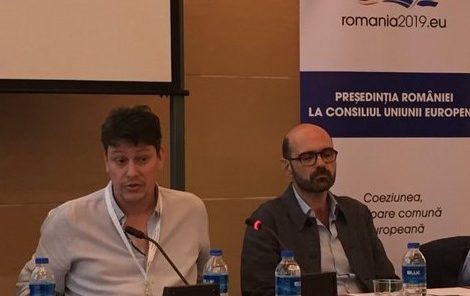After the adoption of the directive on Copyright in the Digital Single Market in April, the EU Romanian Presidency invited stakeholders to a conference on the implementation process of the new copyright rules, Bucharest, 19 and 20 June.
The conference aimed at providing a framework for debate and analysis of the new provisions of this directive, focusing on its core elements and regulations designed for a Digital Single Market that is functional and beneficial to all EU citizens.
UNI MEI Head of Department Johannes Studinger participated in a panel discussion on the implementation of the new rules on fair remuneration of authors and performers. Other panellists included FIAPF Director General Benoît Ginisty, EBU Policy Advisor Vincent Sneed and FERA CEO Pauline Durand-Vialle. FERA and UNI MEI, together with other organisations such as FIA, FIM and the FSE, have campaigned hard throughout the legislative process to achieve the strengthening of the contractual position of authors and performers vis-à-vis their employers.
Both, FERA and UNI MEI stressed that the new legislation is a turning point for the sector: EU member states are now to ban abusive practices such as complete buyout contracts and the importance of collective bargaining as a mechanism to negotiate fair contracts and remuneration is a new tool for unions and guilds to build a more sustainable dialogue with producers and broadcasters. It is a positive pointer for the future that international employers’ associations such as FIAPF and EBU underlined the positive function of collective bargaining agreements to provide a framework for contracts.
For UNI MEI the implementation of the new rules on fair remuneration need to be based on three guiding principles: (1) transparency of the economic exploitation of works, (2) responsibility of employers and representative organisations of authors and performers, to act in good faith throughout the implementation process in advising national governments and (3) dialogue to establish guiding principles for implementation of the provisions of the directive at European level and by negotiating collective agreements on fair remuneration at national level.
The first informal meetings between European representatives of industry, unions and guilds that took place prior to the EU Romanian Presidency conference underline that there is scope for a constructive dialogue process on the implementation of the new rules on fair remuneration. UNI MEI will continue to support affiliates during the implementation process as a priority and will work in close cooperation with its sister organisations and through dialogue with industry towards an implementation of the directive that fosters investment in the audiovisual industry and improves the rights and economic situation of creators.


